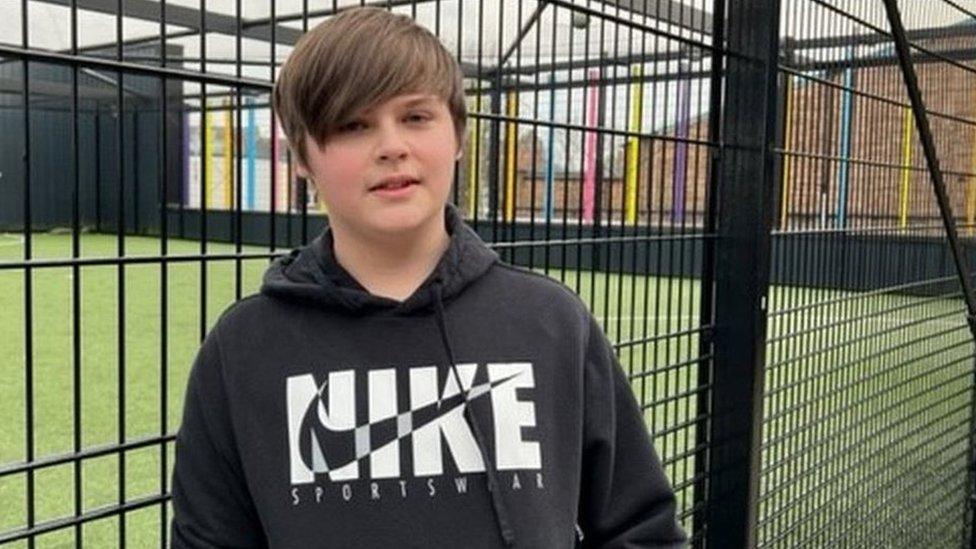NI education: More than 1,700 persistently absent pupils given no support
- Published

The principal of Botanic Primary in Belfast, Paul Bell, said that the majority of pupils he had referred to EWS for attendance problems had not been allocated support
More than 1,700 pupils who are persistently absent have not been allocated any support to help them attend school.
According to the Education Authority (EA), 1,751 children were on a waiting list for the Education Welfare Service (EWS) at the end of March 2023.
That is about 40% of all pupils who have been referred to the service.
If a child is persistently absent, schools refer them to the EWS to try to help them attend school more.
One Belfast principal told BBC News NI that the number of pupils who had not been allocated EWS help was creating a massive problem for schools.
According to previous figures from the Department of Education (DE), there was a significant rise in school absences after the pandemic and lockdowns.
The 2021/22 attendance statistics in Northern Ireland show that almost 10% of school days were missed by pupils due to absence.
The children's commissioner in England has previously expressed concern that some pupils never fully returned to school after lockdowns.
If a pupil is persistently absent in Northern Ireland, schools can refer them to the EWS for help to get them to attend regularly again.

One possible factor has been a long-running pay dispute between the Education Authority and education welfare officers
But the principal of Botanic Primary in Belfast, Paul Bell, said the majority of pupils he had referred to EWS for attendance problems had not been allocated support.
"Schools work for a long time with pupils and families to try to improve attendance before we approach the Education Welfare Service," he told BBC News NI.
"We are in constant contact with the families of pupils to try to get them to come to school more, including staff engaging directly with parents.
"We approach the welfare service to provide specialist help when we feel as a school we can do no more."
'Not getting support'
Mr Bell said that of 12 referrals to the service he had made this year, only two are currently allocated to an education welfare officer.
"The other pupils are highly unlikely to be allocated this academic year barring something short of a miracle," he added.
"It means they're missing out and not getting the support they need to encourage them to come to school.
"It's not the children's fault and my teachers are doing their best, compassionately, but it seems without any support."
There has been a long-running pay dispute between the Education Authority and education welfare officers, which has led to action short of strike.
The NIPSA union has previously claimed that failure by the EA to resolve the dispute has led to some pupils waiting up to a year before being allocated to an education welfare officer.
But one experienced welfare officer who spoke to BBC News NI said that cuts to health and other services were also to blame for waiting lists.
"There are a lot of children with undiagnosed additional needs presenting to our service," they said.
"They're going on to waiting lists in the health service and they're waiting for Child and Adolescent Mental Health Services (CAMHS) as well.
"They face a very protracted period of time to get help, sometimes years."
'Very worrying situation'
They added that "cuts to services for young people are going to make things worse".
"Then there's increasing pressures some face in schools, like constant testing.
"When you put all these ingredients together it makes for a very worrying situation.
"Our young people aren't being valued."
According to figures provided by the Education Authority, 1,751 out of 4,346 pupils referred to the EWS by schools were on a waiting list to be allocated to an officer at the end of March 2023.
The authority employs about 120 officers on a full or part-time basis.
In a statement, a spokesperson for the Education Authority said that referrals to the service had been on the increase "particularly since the end of the Covid lockdown period".
"There are likely to be a number of complex reasons which impact on regular school attendance including increased levels of anxiety, mental health and socio-economic disadvantage," the statement continued.
"The EWS waiting list is not static and is subject to review and triage by senior education welfare officers.
"Risks are managed by prioritising for immediate allocation, or allocation as soon as possible for those cases which have high-risk factors and low levels of existing support from other services or agencies."
Related topics
- Published27 January 2023

- Published9 March 2022
